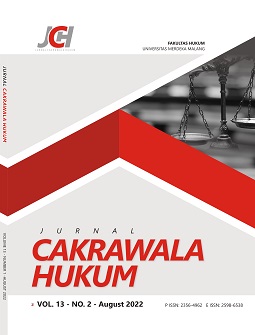Confidentiality of the notary deed in the freedom of the academic pulpit
DOI:
https://doi.org/10.26905/idjch.v13i2.5735Keywords:
Notary, Confidential Contents of Deed, Academic Pulpit.Abstract
Many academic community members abuse the academic pulpit's freedom for inappropriate purposes. The purpose of this paper is to analyze the conflict or conflict of norms in the Article related to the obligation of a Notary to keep everything regarding the Deed he made and the explanation of the Article associated with the freedom of the academic pulpit (Article 8 Paragraph (1), Law of the Republic of Indonesia Number 12 the Year 2012), in the Republic of Indonesia. On the one hand, a notary must keep everything about the deed he made secret; on the other hand, a notary who is a teaching staff or lecturer must carry out his duties as an academic civitas. This writing uses a normative juridical method with a statute and conceptual approach. The results obtained are that the position of a notary is higher than the position of a notary as a lecturer; therefore, the notary's limitations regarding the academic pulpit are to the position of a notary as a public official, whereas a public official a notary is obliged to keep everything related to the deed he made, which means that he has been ordered to a notary. Not to give, show or notify the act’s contents except those with a direct interest. Therefore, regulators should study further if there is a conflict of norms in the Articles related to the Notary's obligation to keep everything confidential regarding the Deed he made.
How to cite item:Â
Margiyanti, R., Negara, T., & Sjafi’i, R. (2022). Confidentiality of the notary deed in the freedom of the academic pulpit. Jurnal Cakrawala Hukum, 13(2), 182-193. DOI:https://doi.org/10.26905/idjch.v13i2.5735.
Downloads
References
Abida, R, D., & Irham, R. R. (2021). Tanggung Jawab Notaris Terhadap Waarmerking Akta Di Bawah Tangan Yang Pembuatannya Dibantu Oleh Notaris, Jurnal Education And Development, vol. 9(1), p. 154-157, DOI: https://doi.org/10.37081/ed.v9i1.2328.
Adjie, H., & Agustini, S. (2022). Kode Etik Notaris Menjaga Isi Kerahasiaan Akta Yang Berkaitan Dengan Hak Ingkar Notaris (UUJN Pasal 4 Ayat 2). Jurnal Hukum dan Kenotariatan, 6(1), 21-1, DOI: https://doi.org/10.33474/hukeno.v6i1.11130.
Adnyana, I. (2022). Kedudukan notaris sebagai turut tergugat dalam perkara perdata. Jurnal Cakrawala Hukum, 13(1), 49-57. DOI: https://doi.org/10.26905/idjch.v13i1.7741.
Ferdiana, H., Amirulloh, M., & Saleh, K. (2021). Urgensi Akta Notaris Dalam Perjanjian Pengalihan Lisensi Rahasia Dagang Sebagai Upaya Memberikan Kepastian Hukum Para Pihak. Jurnal Litigasi (E-Journal), 22(1), 111-132. DOI: https://doi.org/10.23969/litigasi.v22i1.3883.
Kusbianto, Safnul, D., Yasid, F., & Suparman. (2020). Kesadaran Hukum Masyarakat Tentang Pentingnya Aktaautentik Yang Dibuat Oleh Notaris. Reswara, 1(2), 1-6, DOI: https://doi.org/10.46576/rjpkm.v1i2.634.
Lubis, S. K. (2012). Etika Profesi Hukum. cet. VI. Jakarta: Sinar Grafika.
Manik, P. B. R. F. (2021). Analisis Yuridis Terhadap Pasal 37 Uujn-P Nomor 2 Tahun 2014 Tentang Jabatan Notaris Dan Kode Etik Notaris Mengenai Sanksi Bagi Notaris Yang Menolak Memberikan Jasa Hukum Secara Cuma-Cuma Kepada Orang Yang Tidak Mampu. Recital Review, 3(1), 89-105. DOI: https://doi.org/10.22437/rr.v3i1.1067.
Pramudyo, E., Mayana, R. F., & Ramli, T. S. (2021). Tinjauan Yuridis Penerapan Cyber Notary Berdasarkan Perspektif UU ITE dan UUJN. Jurnal Indonesia Sosial Sains, 2(8), 1239–1258. DOI: https://doi.org/10.36418/jiss.v2i8.382.
Prodjodikoro, W. (2003). Tindakan-tindakan Pidana Tertentu di Indonesia. Bandung: Refika Aditama.
Putra, E. P., Yuliandri, & Fendri, A. (2020). Kedudukan dan Tanggung Jawab Notaris Penerima Protokol Notaris yang Meninggal Dunia. Al-Hurriyah, 5(1), 205-215, DOI: https://doi.org/10.30983/alhurriyah.v5i1.2608.
Putri, A. R. (2011). Perlindungan Hukum Terhadap Notaris; Indikasi Tugas Jabatan Notaris Yang Berimplementasi Perbuatan Pidana. Bandung: Sofmedia.
Putri, B. P., & Wardhana, M. (2020). Implementasi Tanggung Jawab Hukum Atas Perbuatan Malpraktik Yang Dilakukan Oleh Notaris Pengganti. Novum, 7(2), 178-184, DOI: https://doi.org/10.2674/novum.v7i2.32280.
Putri, N. A., Thaib, H. M. H., & Barus, U. H. (2021). Penolakan Notaris Muslim Terhadap Pembuatan Akta Ribawi (Perspektif UUJN Dan Hukum Islam). Jurnal Hukum Kaidah, 21(1), 17-25, DOI: https://doi.org/10.30743/jhk.v21i1.4295.
Rachmawati, A., & Arly, I. (2021). Menilai Autensitas Akta Dalam Perspektif Pasal 38 UUJN. Jurnal Hukum dan Kenotariatan, 5(3), 457-453, DOI: https://doi.org/10.33474/hukeno.v5i3.11059.
Rahardjo, S. (2009). Pendidikan Hukum sebagai Pendidikan Manusia: Kaitannya dengan Profesi Hukum dan Pembangunan Hukum Nasional. Yogyakarta: Genta Publishing.
Rahardjo, S. (2007). Mendudukkan Undang-Undang Dasar: Suatu Pembahasan dari Optik Ilmu Hukum. Yogyakarta: Genta Press.
Rahmayani, S., Sanusi, & Abdurrahman, T. (2020). Perubahan Minuta Akta Oleh Notaris Secara Sepihak Tanpa Sepengetahuan Penghadap. Jurnal IUS, 8(1), 14-1, DOI: https://doi.org/10.29303/ius.v8i1.679.
Sugandhi. (2002). KUHP dan Penjelasanya. Surabaya: Usaha Nasional.
Additional Files
Published
How to Cite
Issue
Section
License
Copyright (c) 2022 Jurnal Cakrawala Hukum

This work is licensed under a Creative Commons Attribution-ShareAlike 4.0 International License.
Authors who publish in this journal agree to the following terms:
The copyright of the received article shall be assigned to the journal as the publisher of the journal. The intended copyright includes the right to publish the article in various forms (including reprints). The journal maintains the publishing rights to the published articles. Authors must agree to the copyright transfer agreement by checking the Copyright Notice column at the initial stage when submitting the article.









